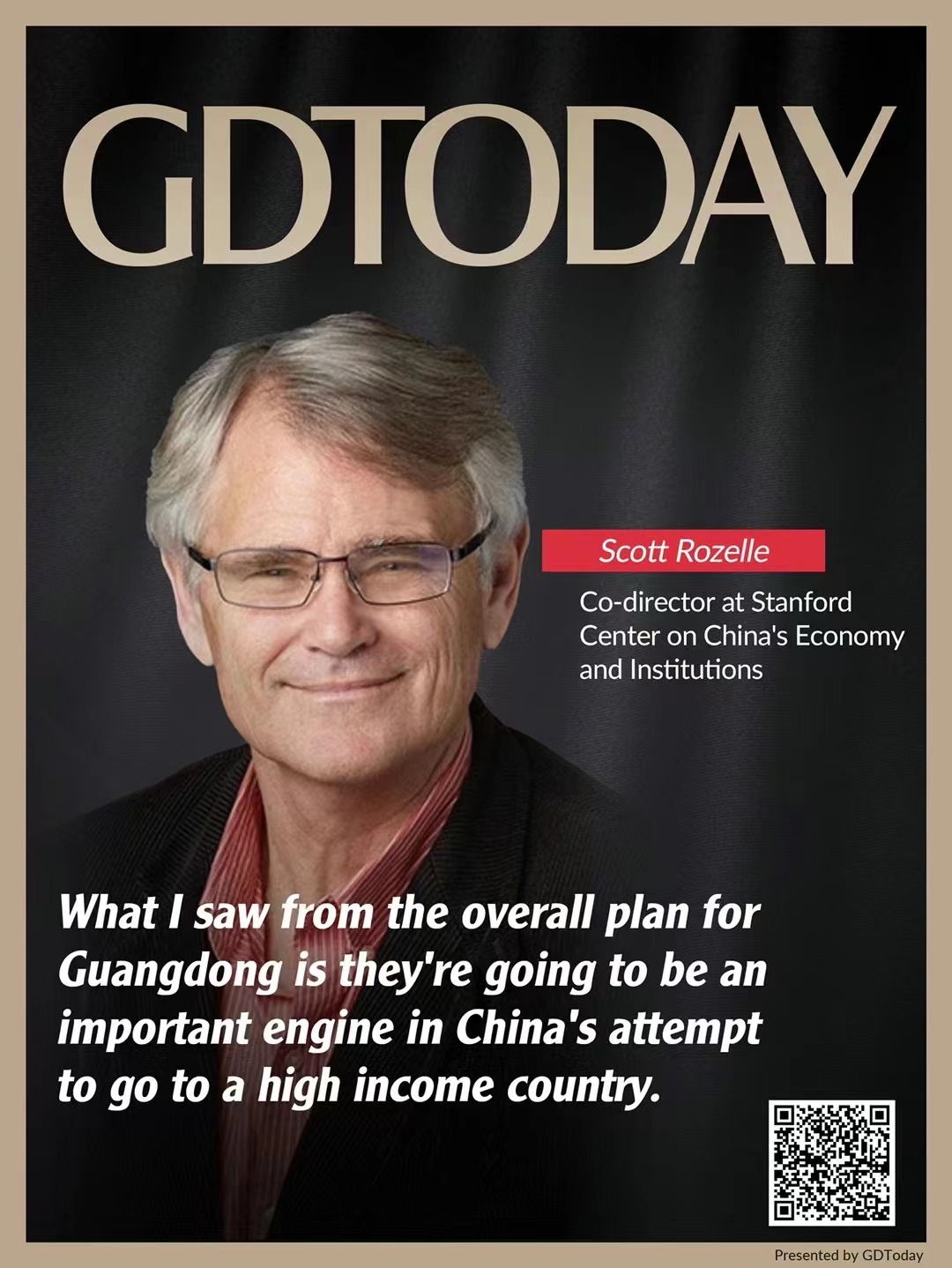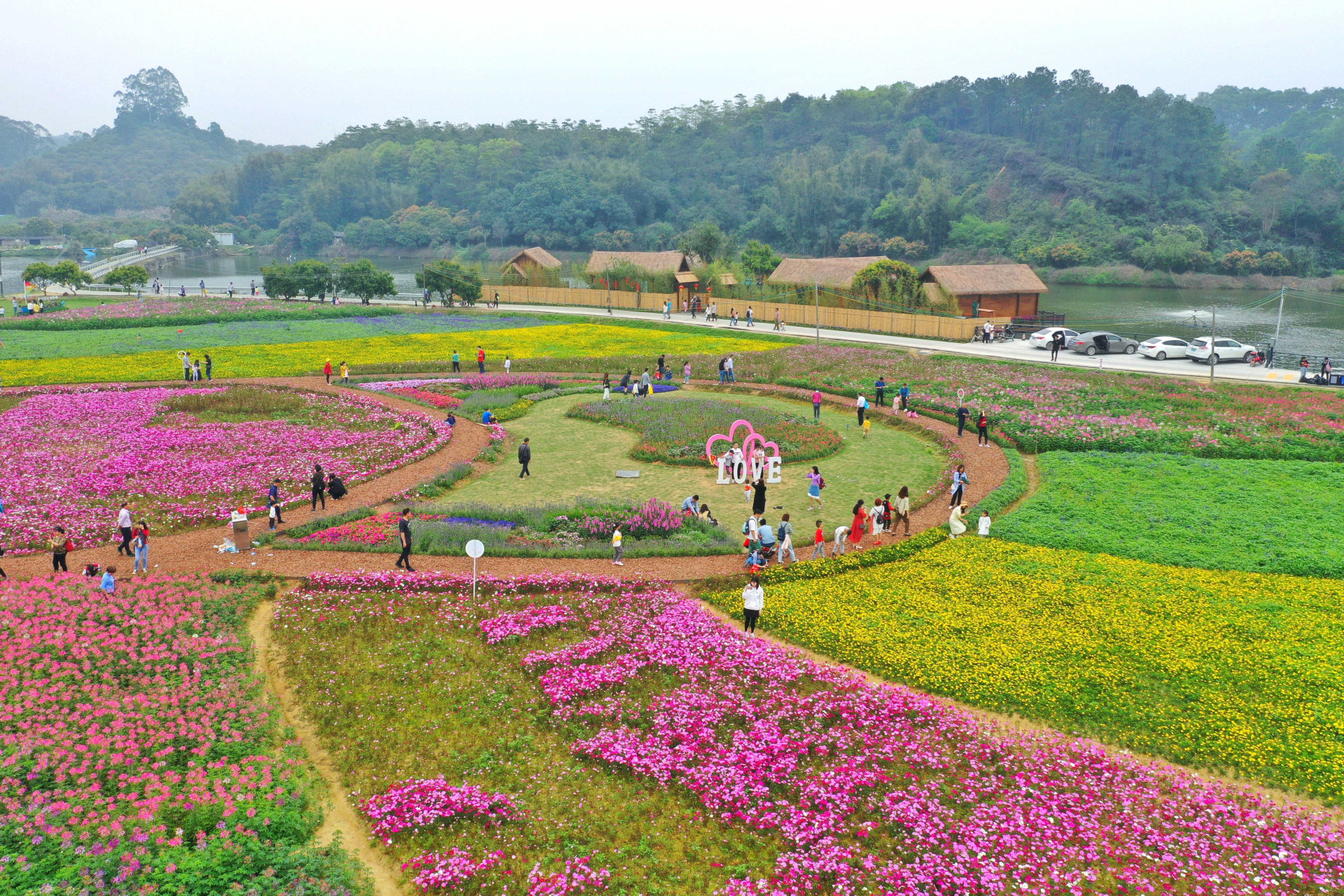"What I saw from the overall plan (from the 2023 Guangdong Provincial Government Work Report) for Guangdong is that they're going to be a leader in China's goal to become a high-income country. So, integrating rural with urban and trying to raise human capital in rural areas are exactly what you need to do right now," said Scott Rozelle, Co-director of Stanford Center on China's Economy and Institutions in the Freeman Spogli Institute for International Studies and Stanford Institute for Economic Policy Research at Stanford University, in an exclusive interview with GDToday.

Rozelle has studied China's economic development for more than 40 years, focusing on both development and agricultural economics. He was awarded the Friendship Award of the Chinese Government in 2008. Also, he has a deep understanding of Guangdong. He has collaborated on numerous research projects with universities from Guangzhou, Shenzhen, Qingyuan, and other locations, including Sun Yat-sen University, South China Agricultural University, and others. He has done many joint research projects with Sun Yat-sen University, South China Agricultural University, and other universities, with footprints in Guangzhou, Shenzhen, Qingyuan, and other places.
Through his long-term observation and research, Rozelle has deeply felt the resilience and vitality of Guangdong's economy. Guangdong, he says, "has probably done everything right," which explains why the province's GDP has ranked first in China for 34 years.

(Photo: Nanfang Daily)
Main force to help China become a middle-income country
According to the 2023 Guangdong Provincial Government Work Report, in the past five years, 1.615 million relatively poor people in the province have been lifted out of poverty, and 2277 relatively poor villages have been lifted. The growth rate of farmers' income has been faster than urban residents for ten consecutive years.
Rozelle was not surprised at all. He believes Guangdong is one of the leading forces in helping China develop from a low-income to a middle-income country.
The World Bank assigns the world’s economies to four income groups-low, lower-middle, upper-middle, and high income. The classifications are updated each year on July 1 and are based on the GNI per capita of the previous year (2021). According to the latest data released by the World Bank, in 2021, GNI per capita below $1085 is low income, between $1086 and $4255 is lower-middle income, between $4256 and $13205 is upper-middle income, and above $13205 is high income.
In Rozelle's view, over the past 40 years, Guangdong has made great efforts to consolidate its manufacturing base and expand the modern service industry. At the same time, it has continued to deepen reform and opening up, attracting more foreign capital, and its economic growth has reached a new high year after year. As a result, the income of ordinary people, especially farmers, has risen with the tide, and rural areas have also gained more development opportunities.
Guangdong has comprehensively reduced poverty and increased wealth, yet numerous low-income groups continue to exist. Rozelle indicated that now China and Guangdong face a more difficult challenge: how to push low-income people into the middle-income group. Data shows that in the past 70 years, only 23 countries have successfully graduated from upper-middle-income to high-income countries.
Let more people choose to work and live in counties
Rozelle said if 80% of low-income people in China can become middle-income, it will generate more significant momentum. "I can see two solutions in the planning of Guangdong (government work report)," he said.
Strengthening the economy of counties is one of them. Rozelle believes that it is the best choice for China and Guangdong to let more people choose to work and live in counties.
According to the report on the work of the government, in the next five years, Guangdong will focus on balanced and coordinated development by concentrating more on county development and promoting the orderly transfer of industries in the Pearl River Delta to eastern, western and northern Guangdong.
Rozelle suggested that Guangdong should encourage the development of related leading industries in counties according to local conditions, promote the development of the private economy, and provide many preferential policies for private enterprises, including loans. This can boost the county economy and generate lots of jobs to benefit the urban population.
Rozelle also proposed that the government should support people with rural household registration into the county social security system, as well as provide low-cost housing and unemployment insurance and regular employment training for the unemployed to help them find new jobs.
These are all plans on Guangdong's agenda. On November 11, when attending a joint seminar at the 13th session of the Guangdong CPPCC, Wang Weizhong, governor of Guangdong Province, proposed that the next step for Guangdong would be to upgrade the transportation infrastructure in counties. Also, Guangdong will continue improving public services such as education, health care, and pensions, making counties attractive for farmers.
Increase investment in human capital in rural areas
Strengthening education is another solution that Rozelle saw in the Guangdong government work report. He noted that according to the report, Guangdong would promote the inclusive development of preschool education and special education, balance the resource allocation of compulsory education, and upgrade the counties’ high schools, which is consistent with the results of recent research he has conducted.
According to his team's research, to promote more low-income people into the middle-income ranks, it is necessary to strengthen their primary education, especially in mathematics, science, computing, and language. According to his observation, many farmers aged 20-30 in China have relatively low mastery of these subjects because of their relatively weak schooling. Therefore, he believes that the above proposal is the best course of action.
Rozelle also pointed out that the government could guide rural people to strengthen their awareness of family education for the next generation of children, especially infants aged 0-3, and provide related training.
Rozelle believes that Guangdong's plan to strengthen rural education and increase investment in human capital will surely gather more momentum in rural areas, which in turn will promote the high-quality development of the whole province.
Reporter: Nan
Editors: Wing, James
















